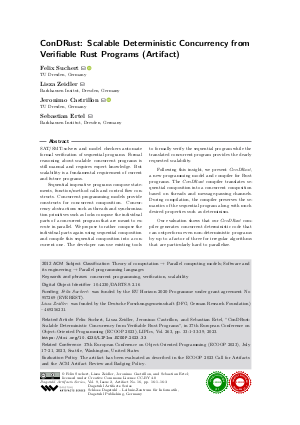ConDRust: Scalable Deterministic Concurrency from Verifiable Rust Programs (Artifact)
Authors
Felix Suchert  ,
Lisza Zeidler,
Jeronimo Castrillon
,
Lisza Zeidler,
Jeronimo Castrillon  ,
Sebastian Ertel
,
Sebastian Ertel
-
Part of:
Issue:
Special Issue of the 37th European Conference on Object-Oriented Programming (ECOOP 2023)
Part of: Volume: DARTS, Volume 9 (ECOOP 2023)
Part of: Conference: European Conference on Object-Oriented Programming (ECOOP)
Part of: Journal: Dagstuhl Artifacts Series (DARTS) - License:
 Creative Commons Attribution 4.0 International license
Creative Commons Attribution 4.0 International license
- Publication Date: 2023-07-11
Artifact Description

PDF
DARTS.9.2.16.pdf
- Filesize: 0.53 MB
- 3 pages
Document Identifiers
Subject Classification
ACM Subject Classification
- Theory of computation → Parallel computing models
- Software and its engineering → Parallel programming languages
Keywords
- concurrent programming
- verification
- scalability
Metrics
- Access Statistics
-
Total Accesses (updated on a weekly basis)
0Document
0Metadata
Artifact
DARTS-9-2-16-artifact-670b7c3d47310b956acf3c451b35a6a9.tgz
(Filesize: 1.71 GB)
MD5 Sum:
670b7c3d47310b956acf3c451b35a6a9
(Get MD5 Sum)
Artifact Evaluation Policy
The artifact has been evaluated as described in the ECOOP 2023 Call for Artifacts and the ACM Artifact Review and Badging Policy
Abstract
SAT/SMT-solvers and model checkers automate formal verification of sequential programs. Formal reasoning about scalable concurrent programs is still manual and requires expert knowledge. But scalability is a fundamental requirement of current and future programs. Sequential imperative programs compose statements, function/method calls and control flow constructs. Concurrent programming models provide constructs for concurrent composition. Concurrency abstractions such as threads and synchronization primitives such as locks compose the individual parts of a concurrent program that are meant to execute in parallel. We propose to rather compose the individual parts again using sequential composition and compile this sequential composition into a concurrent one. The developer can use existing tools to formally verify the sequential program while the translated concurrent program provides the dearly requested scalability. Following this insight, we present ConDRust, a new programming model and compiler for Rust programs. The ConDRust compiler translates sequential composition into a concurrent composition based on threads and message-passing channels. During compilation, the compiler preserves the semantics of the sequential program along with much desired properties such as determinism. Our evaluation shows that our ConDRust compiler generates concurrent deterministic code that can outperform even non-deterministic programs by up to a factor of three for irregular algorithms that are particularly hard to parallelize.
Cite As Get BibTex
Felix Suchert, Lisza Zeidler, Jeronimo Castrillon, and Sebastian Ertel. ConDRust: Scalable Deterministic Concurrency from Verifiable Rust Programs (Artifact). In Special Issue of the 37th European Conference on Object-Oriented Programming (ECOOP 2023). Dagstuhl Artifacts Series (DARTS), Volume 9, Issue 2, pp. 16:1-16:3, Schloss Dagstuhl – Leibniz-Zentrum für Informatik (2023)
https://doi.org/10.4230/DARTS.9.2.16
BibTex
@Article{suchert_et_al:DARTS.9.2.16,
author = {Suchert, Felix and Zeidler, Lisza and Castrillon, Jeronimo and Ertel, Sebastian},
title = {{ConDRust: Scalable Deterministic Concurrency from Verifiable Rust Programs (Artifact)}},
pages = {16:1--16:3},
journal = {Dagstuhl Artifacts Series},
ISSN = {2509-8195},
year = {2023},
volume = {9},
number = {2},
editor = {Suchert, Felix and Zeidler, Lisza and Castrillon, Jeronimo and Ertel, Sebastian},
publisher = {Schloss Dagstuhl -- Leibniz-Zentrum f{\"u}r Informatik},
address = {Dagstuhl, Germany},
URL = {https://drops.dagstuhl.de/entities/document/10.4230/DARTS.9.2.16},
URN = {urn:nbn:de:0030-drops-182562},
doi = {10.4230/DARTS.9.2.16},
annote = {Keywords: concurrent programming, verification, scalability}
}
Author Details
Funding
- Suchert, Felix: was funded by the EU Horizon 2020 Programme under grant agreement No 957269 (EVEREST).
- Zeidler, Lisza: was funded by the Deutsche Forschungsgemeinschaft (DFG, German Research Foundation) - 469256231.
Related Article
- Felix Suchert, Lisza Zeidler, Jeronimo Castrillon, and Sebastian Ertel, "ConDRust: Scalable Deterministic Concurrency from Verifiable Rust Programs", in 37th European Conference on Object-Oriented Programming (ECOOP 2023), LIPIcs, Vol. 263, pp. 33:1-33:39, 2023. https://doi.org/10.4230/LIPIcs.ECOOP.2023.33
References
-
Christian Bienia and Kai Li. Parsec 2.0: A new benchmark suite for chip-multiprocessors. In Proceedings of the 5th Annual Workshop on Modeling, Benchmarking and Simulation, volume 2011, page 37, 2009.

-
Brian F. Cooper, Adam Silberstein, Erwin Tam, Raghu Ramakrishnan, and Russell Sears. Benchmarking cloud serving systems with ycsb. In Proceedings of the 1st ACM symposium on Cloud computing, pages 143-154, 2010.

-
Chi Cao Minh, JaeWoong Chung, Christos Kozyrakis, and Kunle Olukotun. Stamp: Stanford transactional applications for multi-processing. In 2008 IEEE International Symposium on Workload Characterization, pages 35-46. IEEE, 2008.

